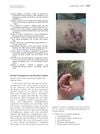 50 citations,
March 2000 in “American Journal of Clinical Dermatology”
50 citations,
March 2000 in “American Journal of Clinical Dermatology” Alopecia Areata has no guaranteed treatment for hair regrowth, but options like corticosteroids and minoxidil are used, with future research focusing on genetic and immune therapies.
 49 citations,
April 2000 in “Journal of The American Academy of Dermatology”
49 citations,
April 2000 in “Journal of The American Academy of Dermatology” Despite progress in treatment, the exact cause of Alopecia areata is still unknown.
 43 citations,
March 2006 in “Seminars in Cutaneous Medicine and Surgery”
43 citations,
March 2006 in “Seminars in Cutaneous Medicine and Surgery” Different types of hair loss have unique features under a microscope, but a doctor's exam is important for accurate diagnosis.
[object Object]  34 citations,
October 2011 in “Pathology Research International”
34 citations,
October 2011 in “Pathology Research International” Behçet's Disease may be caused by genetic and environmental factors leading to abnormal immune responses, and stress management and new treatments could improve patient outcomes.
 24 citations,
March 2018 in “Experimental Dermatology”
24 citations,
March 2018 in “Experimental Dermatology” Treg dysfunction is linked to various autoimmune skin diseases, and understanding Treg properties is key for new treatments.
 22 citations,
April 1985 in “Australasian Journal of Dermatology”
22 citations,
April 1985 in “Australasian Journal of Dermatology” Beta-blockers can cause rare skin side-effects, which usually improve after stopping the medication.
19 citations,
August 2017 in “American journal of clinical dermatology” Hepatitis B virus exposure may be linked to increased risk of alopecia areata.
 17 citations,
July 1994 in “Journal of Dermatological Science”
17 citations,
July 1994 in “Journal of Dermatological Science” The cause of alopecia areata is likely a mix of genetics, immune system issues, and environmental factors, with more research needed to understand it fully.
 15 citations,
April 2003 in “Journal of dermatology”
15 citations,
April 2003 in “Journal of dermatology” Alopecia areata causes hair loss due to an immune attack on hair follicles, influenced by genetics and environment.
 14 citations,
January 2005 in “Pediatric Dermatology”
14 citations,
January 2005 in “Pediatric Dermatology” UVA1-light therapy successfully treated a child's skin condition, mycosis fungoides.
 13 citations,
February 2007 in “British Journal of Dermatology”
13 citations,
February 2007 in “British Journal of Dermatology” EF and PXE not closely related.
 11 citations,
April 2020 in “Journal of The American Academy of Dermatology”
11 citations,
April 2020 in “Journal of The American Academy of Dermatology” Microinflammation is more intense in smaller hair follicles and may be linked to hair loss.
 11 citations,
March 2007 in “Digestive Diseases and Sciences”
11 citations,
March 2007 in “Digestive Diseases and Sciences” The conditions alopecia areata, primary sclerosing cholangitis, and ulcerative colitis may be linked by shared autoimmune and cell death mechanisms.
 5 citations,
June 2022 in “Frontiers in immunology”
5 citations,
June 2022 in “Frontiers in immunology” Increasing Treg cells in the skin does not cure hair loss from alopecia areata in mice.
 4 citations,
May 2019 in “Journal of The European Academy of Dermatology and Venereology”
4 citations,
May 2019 in “Journal of The European Academy of Dermatology and Venereology” Hair loss treatment caused more hair loss in a man.
 4 citations,
July 2012 in “Dermatologic Clinics”
4 citations,
July 2012 in “Dermatologic Clinics” New biopsy techniques and tools improve alopecia diagnosis, and both too much and too little selenium can cause hair loss.
 1 citations,
June 2014 in “International Journal of Dermatology”
1 citations,
June 2014 in “International Journal of Dermatology” Pregnancy can trigger follicular mucinosis, which may resolve after delivery.

New insights into cell communication in psoriasis suggest innovative drug treatments.
 April 2023 in “IP Indian journal of clinical and experimental dermatology”
April 2023 in “IP Indian journal of clinical and experimental dermatology” Lichen planus is a chronic autoimmune disease that is hard to treat and more common in women.
 March 2023 in “Clinical, cosmetic and investigational dermatology”
March 2023 in “Clinical, cosmetic and investigational dermatology” IL-33 is linked to hair follicle damage in psoriasis and could be a treatment target for hair loss in this condition.
 September 2022 in “Intisasi sains media”
September 2022 in “Intisasi sains media” A young child with complete hair loss improved significantly with a combination of hair growth treatments and laser therapy.
 August 2016 in “Journal of Investigative Dermatology”
August 2016 in “Journal of Investigative Dermatology” Blocking the CCR5 receptor may be a new way to treat hair loss from alopecia areata.
 April 2016 in “Journal of The American Academy of Dermatology”
April 2016 in “Journal of The American Academy of Dermatology” A vitamin and mineral supplement significantly reduced hair shedding in Brazilian women with telogen effluvium.
 January 2007 in “Elsevier eBooks”
January 2007 in “Elsevier eBooks” Alopecia areata is a reversible, autoimmune-related hair loss that can have significant emotional impact and uncertain treatment effectiveness.
 November 1998 in “Journal of The European Academy of Dermatology and Venereology”
November 1998 in “Journal of The European Academy of Dermatology and Venereology” A man's skin cancer improved and some of his hair grew back after treatment with a special light therapy and a medication.
 January 2019 in “Elsevier eBooks”
January 2019 in “Elsevier eBooks” Early detection and skin biopsies are crucial for treating skin cancer and diagnosing various skin conditions.

Alopecia Areata is treated with drugs and therapies to reduce inflammation and immune response.
[object Object] 
A 72-year-old man was diagnosed with a rare skin form of Rosai-Dorfman disease after years of misdiagnosis.
 January 1981 in “The Journal of Toxicological Sciences”
January 1981 in “The Journal of Toxicological Sciences” Hydrocortisone 17-butyrate 21-propionate ointment caused reversible side effects like skin issues, weight gain, and organ changes in dogs.
 130 citations,
October 2006 in “Allergy”
130 citations,
October 2006 in “Allergy” Allergic reactions to blood thinners are rare but can be serious, requiring careful testing and alternative treatments.




























